3 Mins Read
A new report by the Global Commission on Adaptation (GCA), with contributions from major global leaders from 18 different countries and international organisations, has warned of an impending “climate apartheid”. The report also finds that over trillions of dollars in investment is needed in order to build the adequate infrastructure to avoid the disastrous consequences stemming from our climate emergency.
The commission saw global leaders convene to discuss solutions to tackle the biggest threat to our planet – climate change – with contributions from former United Nations Secretary General Ban Ki-moon, Microsoft founder Bill Gates, and heads of the major international governing bodies including the World Bank and UNEP. Released on Monday, the main conclusion from the commission’s report, titled Adapt Now: A Global Call For Leadership On Climate Resilience, is that the world is gravely unready for the effects of climate change, which will have an “irrefutable toll on human life” as it exacerbates poverty, water shortages and mass migration. The study also warns that the greatest obstacle to avoiding these effects is the current lack of collective political leadership to instigate a “revolution” against global warming.
Among some of the GCA’s recommended actions are early warning systems for extreme weather patterns and disasters, developing a food system that can withstand droughts, protecting coastlines and building infrastructure to cope with heatwaves. Unless these precautions are implemented as soon as possible, 100 million more people risk being driven into poverty by 2030, water shortages will affect 5 billion people with many in Asia, and rising sea levels will threaten mass climate migration.
Speaking about the report, Ban Ki-Moon said: “I am really concerned about the lack of vision of political leaders,… [who] are much more interested in getting elected, and climate issues are not in their priorities.”
The CEO of the Global Center on Adaptation, the organisation that led the commission, Patrick Verkooijen added that what we are currently seeing is the “risk of a climate apartheid, where the wealthy pay to escape and the rest are left to suffer. That is a very profound moral injustice.”
If moral human imperatives are insufficient to put an end to our current inaction and ‘business-as-usual’ approach, then the report also outlines a plethora of economic reasons to stop ignoring climate change. It estimates that if US$1.8 trillion is invested globally from 2020 to 2030 in adaptation measures like climate-ready infrastructure and mangrove protection, it would result in US$7.1 trillion in net benefits. Investing in adaptation can also generate a “triple dividend” of avoiding future losses, positive economic gains due to innovation and socio-environmental advantages.
The commission will unveil further announcements at the upcoming UN Climate Summit this month, such as the launch of the “Year of Action”, which aims to mobilise governmental leaders to launch measures now in food security, climate resilience, disaster risk management and finance.
The younger generation have already taken it upon themselves to launch global climate initiatives, such as the proposed Global Climate Strikes organised by students to be held September 20 and 27 around the world. It is high time for politicians and global leaders to follow suit and step up with real action.
Lead image courtesy of AFP/Andrew Carballero-Reynolds.




